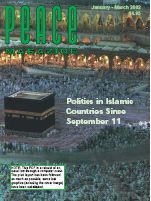
Peace Magazine Jan-Mar 2002, page 12. Some rights reserved.
Search for other articles by John Bacher here
From stereotypical images in television and newspapers, many are led to believe that the Pushtun (Pathan) people, who straddle the border between Pakistan and Afghanistan, are all gun-wielding, authoritarian Islamic fundamentalists. In reality this land is home to one of the world's strongest Gandhian inspired movements for democratic, nonviolent social change. This was founded in the 1920s by the remarkable Islamic prophet of peace, Abdul Gaffar Khan - widely known as Badshah Khan.
Khan's Khudai Khidmatagar (Red Shirt) movement has been recognized by the eminent nonviolence theorist Gene Sharp as one of the world's best organized and heroic efforts to defeat a repressive tyranny by peaceful means.
Tightly disciplined along military lines, the Red Shirts were able to withstand provocative massacres by British troops to achieve their goal - a democratically elected state government for India's North-West Frontier Province. It subsequently was able to implement a variety of reforms to improve public health and basic literacy.
The Red Shirts opposed the partition of India, but when this was imposed by the British, struggled bravely to make Pakistan a successful democratic country. For his democratic struggles, Badshah Khan spent 15 years in prison, at one point being honored by Amnesty International as its prisoner of conscience for the year. In 1956, Khan founded the social democratic Awami National Party. It is now one of the two dominant parties in Bangladesh, and still struggles (albeit without great influence) for the restoration of democracy under military rule in Pakistan. So revered was Badshah Khan among the Pushtuns that when he died in 1988, warfare between the Soviet-backed government of Afghanistan and the mujahideen ceased for a day so that his funeral cortège could travel safely to Jalalabad.
LEGACY TODAY
The mass media, especially in Canada, has given very little coverage to the continuing struggles for freedom by Pakistan's Awami National Party. Consequently, it was a major development when in the December 3, 2001, issue of The New Yorker magazine, British author Isabel Hilton described the cur-rent activities of the Awami League. She found many photographs of Badshah Khan in homes and offices in Peshawar, the capital of Pakistan's predominately Pushtun, North-West Frontier Province. She met with Begum Naseem Wali Khan, the daughter-in-law of Badshah Khan, who said that her husband, Wali Khan, had outraged local clerics by calling for the ouster of the Taliban from power in Afghanistan.
FUTURE POSSIBILITIES
The fall of the Taliban and the discrediting of Pakistan's military rulers who financed them should strengthen the Awami National Party, if, as is scheduled, Pakistan returns to an elected government next year. The continuing strength of the brave Pushtun democrats is part of the reality of a silent majority supporting democracy in predominately Islamic countries, who are ignored by the Canadian mass media.

Peace Magazine Jan-Mar 2002, page 12. Some rights reserved.
Search for other articles by John Bacher here